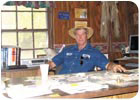
Bob Geyer began his drilling career in 1971.
Summing up the activities of Geyer Drilling Co. in Mansfield, Texas, Bob Geyer tells us, “Basically, we're a domestic water well drilling and repair company. We handle some light commercial repairs, too. And we do a little bit of domestic irrigation, but no large commercial or agricultural irrigation.
“With our summer hires, we're at 11 employees right now. We're running two drill rigs and four service units. The rigs are a Speedstar 30K and an Ingersoll-Rand T3W. The I-R rig is straight air, and the Speedstar is a mud/air combination rig, as we do both types of drilling.”
The company was founded in 1952 by Bob's father, Byman. “He came here from north Texas - out of the oil fields in the Wichita Falls area,” Geyer recounts. “He and my grandfather formed a little business together to drill water wells for the farmers in this part of the country. They worked together for a number of years before my grandfather split off into a different direction. My dad kept the business intact until 1965, when he closed it down temporarily to move to Montana to drill oil and gas wells for five years. Then he returned to Texas, and in 1971, I finished school and joined the newly re-opened business.” One of their first orders of business was buying out an existing drilling contractor in town, who was looking to get out.
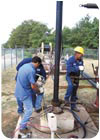
Splicing cable to facilitate the lowering of the well.
An Early Obstacle
Whatever initial plans the Geyers had about getting things up and running and moving forward had to be quickly revised. “We were in business for about three weeks when we went out to do a service job one Sunday morning at a dairy operation. As history would have it,” Geyer says matter-of-factly, “we got into a major power line with the drill rig, and my father was burned quite severely. He spent many months in the hospital, so I ran things until he was able to get back out into the field.” While certainly not the preferred way to accelerate the learning curve, the experience surely steeled both men for the future. “It was 2001 before my dad retired; he passed away in 2003.”Asked about the company's growth and evolution, Geyer says, “We started expanding pretty rapidly in the early 1990s. Things had been kind of rocking along with just my father and myself and a couple helpers using one rig and one service truck. And then, around 1992, things really opened up for us. We replaced our old rig with the Speedstar in 1997, and we added the Ingersoll-Rand as a supplement rig in 2002. Those both were used rigs. The service side of our business had been expanding all along. We had the one service unit prior to 1992, and now we're up to the current four.”

Putting together the wellhead and hooking up the flow pipe.
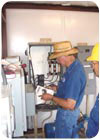
Readjusting the submonitor for a 60-HP motor. Established for a 75-HP motor, the parameters had to be reset.
Looking Ahead
Does that mean expansion is in the cards for the near future? “We're pretty much where I'd like to be at right now,” Geyer says. “We may end up adding another service unit if I can find qualified personnel - and that's a bit of a challenge these days. In our area, if someone is a good, solid, reputable service person who knows what he's doing, he's probably working for himself, so you really can't hire from the outside like that. What we would have to do is hire someone who's young and energetic, with little or no experience, and train that person to do things our way.”As far as getting into other markets, Geyer dismisses the idea - for the most part. “There is a huge gas drilling boom in this area, and we've been doing a little bit of work for those gas drilling concerns, but we're really trying to concentrate on our main residential customer base. On the commercial side, we do the odd project now and then, but nothing heavy - except for some limited service work we do for a few of our special customers.”
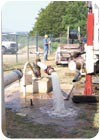
Pump testing the well.
For Example
Apparently, the job I tagged along on was for one of those special customers - a rural cooperative called Bethany Water Supply. “They have five individual well sites - with multiple wells per site,” Geyer explains. “We picked up them as a customer about 18 years ago - that's part of our heavier commercial work. This particular well is in the Trinity aquifer; it's fairly deep - about 1,400 feet. Most of their wells pump from 100 gallons to 150 gallons per minute, using mostly 60-HP to 100-HP pumps.“We had been in there about a month earlier and replaced the old pump with a 75-HP Goulds submersible turbine pump, and everything was working fine; it was pumping about 125 gallons per minute. So about a month later, the water table began to drop, and they were seeing some cavitation, so they wanted us to lower the well. As we lowered the well, it went down about 15 feet and hit the top of the screen liner and would not go inside of it - we had an 8-inch motor, and the their screen and liner was 65⁄8-inch. So we had to remove that pump and go back in with a 60-HP, 6-inch motor and lower it down. We got to about 45, 46 feet when we ran into another obstacle - a transition coupling between the liner pipe and the actual stainless screen, so that's as far as we can lower that well right now.”
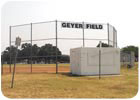
A wonderful legacy: Geyer Field, the first baseball field in Mansfield, Texas, was built in the early 1960s, thanks to a dedicated community effort spearheaded by Byman Geyer.
Prideful Progress
Back in the day, Bob Geyer was a little boy with holes in the knees of his jeans, and Mansfield, Texas, was a little one-horse town that made Mayberry look like Manhattan. Since those days, both Geyer Drilling Co. and Mansfield have grown up nicely together.ND
Report Abusive Comment